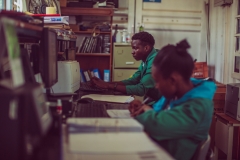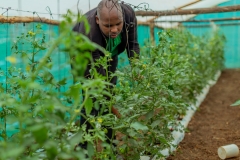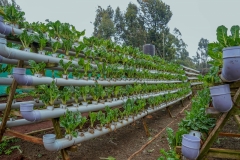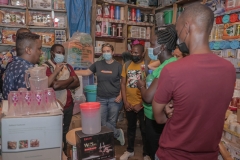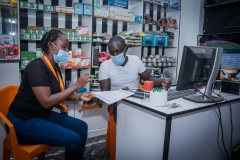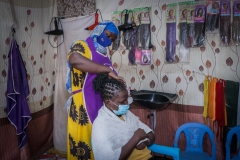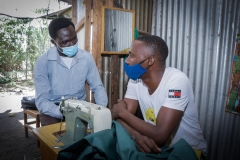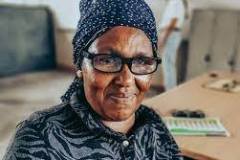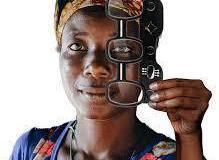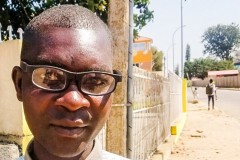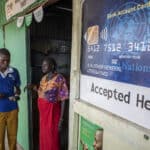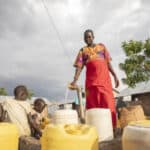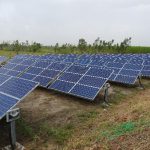TakaTaka Solutions is a waste management company that collects, sorts, composts, and recycles waste materials across three Kenyan cities. With the support from KKCF, TakaTaka Solutions will expand into the Kakuma-Kaloyebei area and establish a buy-back center to collect illegally dumped waste. The company will also create employment for marginalized and refugee populations, whichconstitute the largest population in the area.
Funding Window: Social Enterprise Window
Social Enterprise Window
Kijani Testing Limited IT Support
Kijani Testing Limited specialises in providing field trials and market testing services of renewable energy, off-grid appliances and equipment meant to positively impact the lives of potential users. With the support from KKCF, Kijani Testing Limited will set up hubs in Kakuma and Kalobeyei to educate the communities on sustainable technologies and bridge the gap between innovators and potential customers in the region.
Sanivation Limited
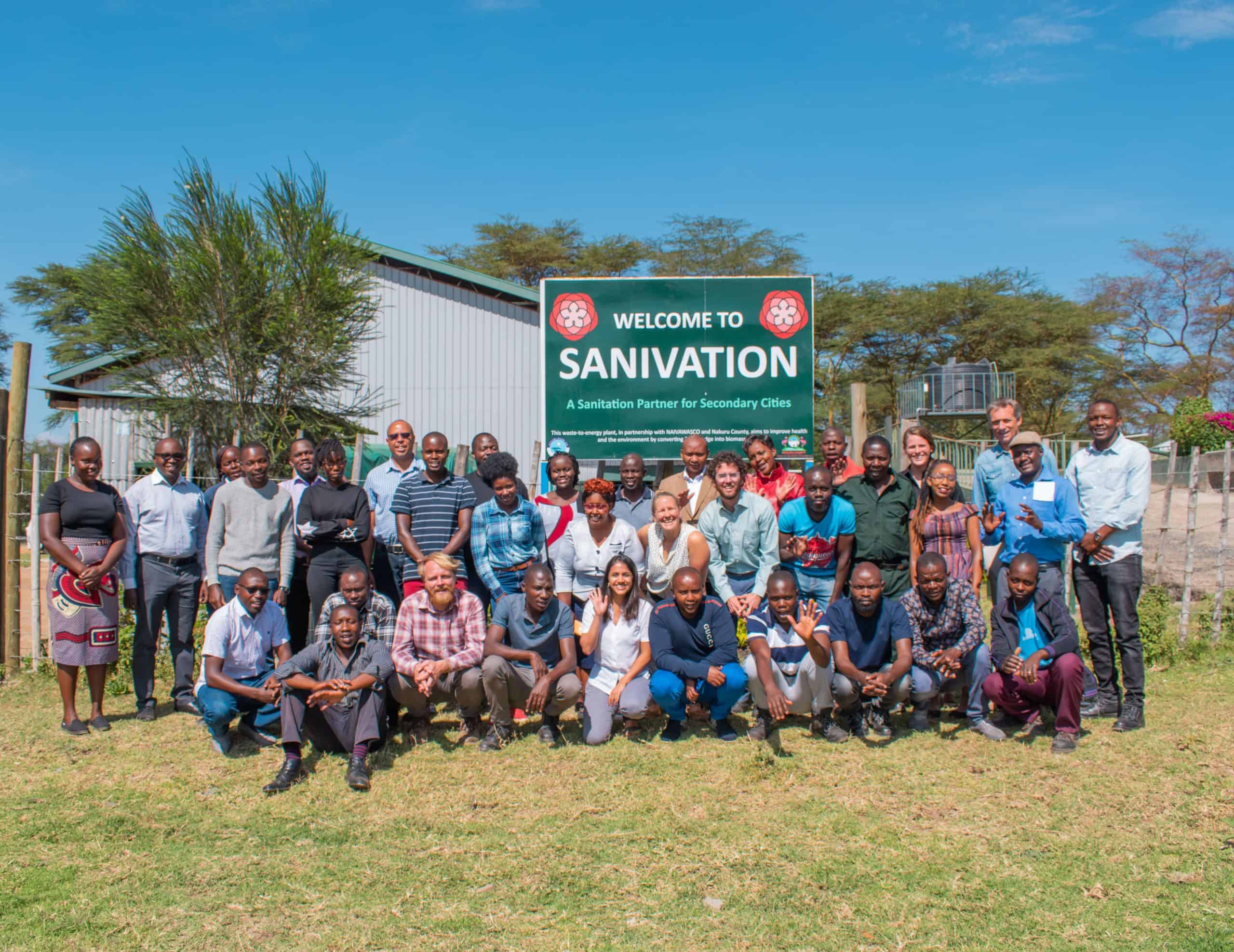
Sanivation Limited is a waste treatment company that partners with local governments to help meet the growing waste processing need from septic tanks and pit latrines. Their model is to build and operate faecal sludge treatment plants so that they can be operationally sustainable. Through the KKCF funding, Sanivation will operate and maintain a fecal sludge treatment plant near Kakuma that will convert waste to low-carbon fuel briquettes. This will provide Kakuma with a safe and affordable place to dispose of human waste, at the same time provide local institutions with a source of sustainable fuel.
Company FAQs
What attracted you to the Kakuma/Kalobeyei area? Why did you choose to apply for the KKCF funding?
This project aligns with our mission to make urbanising communities sustainable. While the current resources are insufficient for Kakuma’s fast-growing population, we are eager to establish an infrastructure and model that will support a durable public service. We are also keen to prevent the consequences of unsafe waste dumping as is the current practice where waste is deposited in a landfill outside the camp, with the likely possibility of future ground water contamination as the camp grows.
What do you look forward to doing in Kakuma/Kalobeyei? How do you see your business growing in the next 5 years? What challenges have you had to overcome?
We will build and operate a fecal sludge treatment plant near Kakuma that converts waste into low-carbon fuel briquettes. The revenue from selling fuel will reduce our plant’s operational costs, supporting long-term sustainability. Our objective is to provide Kakuma with a safe and affordable solution for human waste disposal that is not too far from the camp.
Currently, human waste from Kakuma must be transported all the way to Lodwar for safe disposal, and inevitably, because of the long distance involved, it usually ends up being dumped near the camp. Building a waste disposal plant in Kakuma will decrease the environmental degradation and reduce the current cost of waste collection.
Our second objective is to provide local institutions with a source of sustainable fuel. Our waste conversion process mixes fecal sludge with sawdust. Although biomass is the most-consumed energy source in Kenya, its unsustainable and unimpeded consumption leads to mass deforestation that accelerates climate change. We intend to produce fuel for sale to institutions for use in their biomass boilers, thus replacing firewood, the impact being a reduction in the rate of mass deforestation.
Each ton of fuel sold will save an estimated 22 trees.
The grant will fund:
- Capital costs of a waste-to-value treatment plant.
- Sales costs to secure fuel purchasing contracts with UNHCR and local institutions.
- The plant’s operational costs and fuel production for 18 months, after which it will be operationally sustainable, and sufficient to fund itself.
Sanitation is an expensive public good, yet a private sector actor like Sanivation can make it feasible. Kakuma faces extreme funding constraints that prevent stakeholders from setting up sanitation infrastructure and funding for consistent and effective waste treatment operations. The grant will de-risk a sanitation solution for Kakuma by providing up-front capital to provide sanitation and build a waste-to-value model that is operationally sustainable without further funding. The grant will also incentivise institutions to replace a portion of their firewood purchases with an energy source that does not degrade the environment.
What are the foreseeable impacts in the Kakuma and Kalobeyei area following your interventions?
This project will directly impact 30,000 people and create 10 direct jobs for local staff. The project will save 158,400 trees and 144,000 CO2eq over four years of funding. It will safely treat almost 5,000 tons of human waste from the community.
The negative effects of poor sanitation are greater for women, and improving waste management within Kakuma will benefit them positively. If less firewood is purchased, there will be fewer women facing security risks from firewood collection activities. Women will also have equal opportunities for selection to the jobs we create.
What advice would you give other SMEs that are working in fragile/difficult situations, with refugees and their host communities?
There is little funding for private companies in refugee camps, as resources are channelled through implementing partners. This makes it complex for the private sector actors to launch in Kakuma. However, despite their limited funds, SMEs should still be encouraged to develop long-term and sustainable solutions for both the refugees and host communities.
Waste Electrical and Electronic Equipment Centre
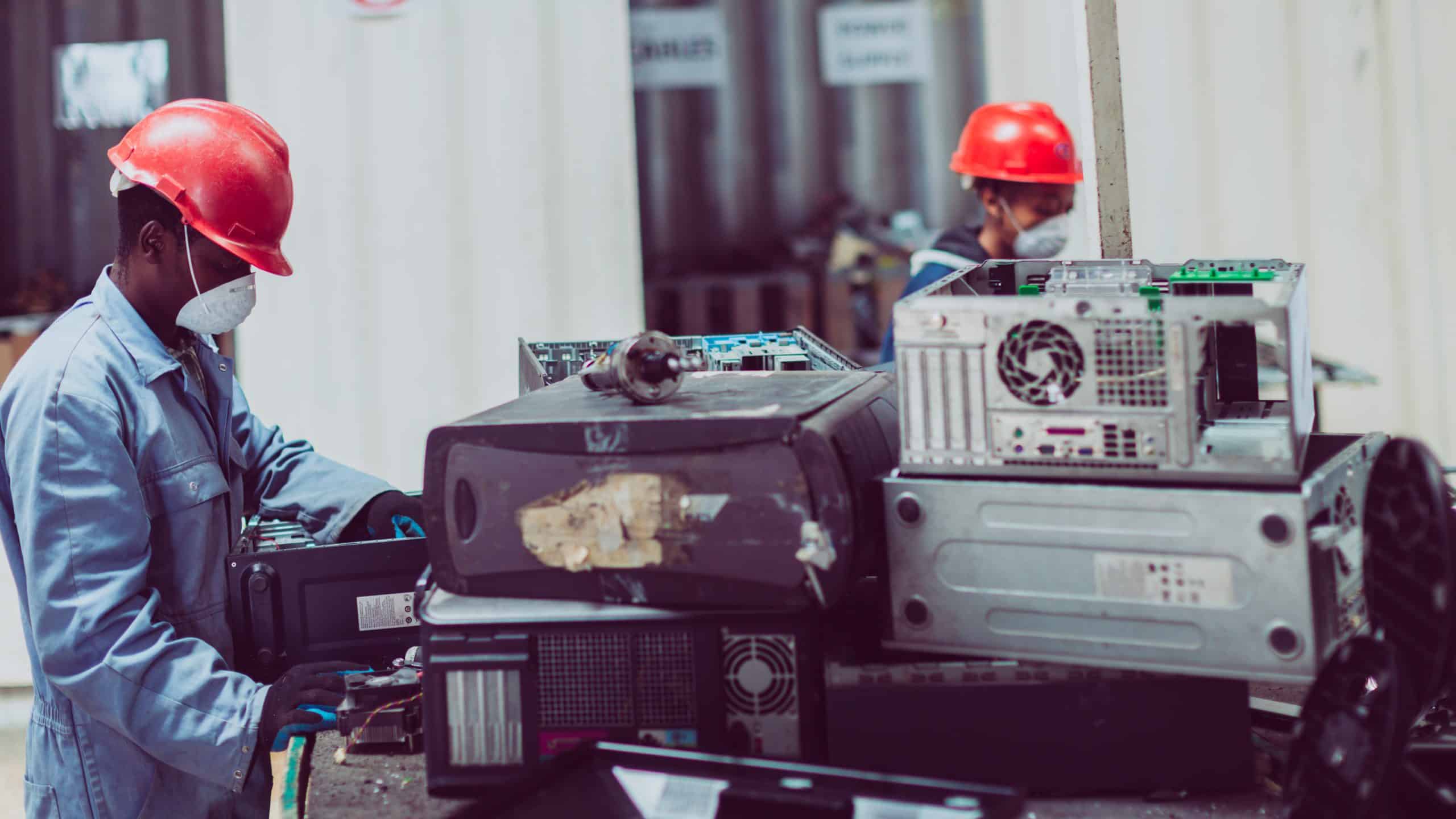
Waste Electrical and Electronic Equipment Centre (WEEE Centre) undertakes e-waste recycling where it safely collects and dismantles e-waste to recover raw materials for recycling into new electronic products.
WEEE Centre has safely and successfully processed over 10,000 tons of e-waste since 2012 and has eight collection centers spread across the country for expanded e-waste collection. Through these safe disposal services, the company has prevented 14,400 tons of CO2 emissions. Additionally, their innovative ways of handling e-waste in Kenya have been adopted in Uganda, Tanzania, Rwanda, Burundi, Madagascar, Ghana, Nigeria, DRC, Eritrea, Ethiopia, Malawi, South Africa, Egypt, and Liberia.
Through the KKCF funding, the company is setting up a training centre that will equip the youth (especially young women) in Kakuma and Kalobeyei with digital literacy, ICT repair and maintenance of electronics, computers and solar equipment, thus providing new income streams for the host community and refugees.
Visit the WEEE website here: https://weeecentre.com/
Company FAQs
What attracted you to the Kakuma/Kalobeyei area? Why did you choose to apply for the KKCF funding?
KKCF funding presented an opportunity for WEEE Centre to reach the refugee and host communities with an e-waste management programme, with the added potential for job creation among the youth.
The growing consumption of ICT and solar powered devices in Kakuma and Kalobeyei by refugee communities and humanitarian organisations, has led to the generation of significant amounts of e-waste, which if it is not managed in a manner that is environmentally friendly, it can become toxic to public health and the environment .
There is a large population of unemployed youth in Kakuma and Kalobeyei that could be engaged to earn decent incomes from e-waste management by collecting, repairing and recycling it.
What do you look forward to doing in Kakuma/Kalobeyei? How do you see your business growing in the next 5 years? What challenges have you had to overcome?
Our operations will concentrate on training agents, public awareness and e-waste management. The trained agents will also act as collectors
and repairers of electronic devices.
Getting qualified refugees and local community members to serve as core project team members has been a challenge. We have had to work with some staff members from Nairobi to train and empower locals before they can take full control.
What are some of the foreseeable impacts in the Kakuma and Kalobeyei area following your interventions?
We anticipate a large population of young people with hands-on skills for the repair and maintenance of electronic devices, as well as sales agents. The intervention will also enhance digital skills, especially among the youth leading to better employment opportunities and economic empowerment.
What advice would you give other SMEs in fragile/difficult situations, with refugees and their host communities?
Empowered agents from the local communities are the key to the success of any business initiative. They adapt easily to the local population and are more appealing to potential customers because ultimately they are familiar with the local culture, and their networks are intact.
Gallery
Kidogo Innovations Limited
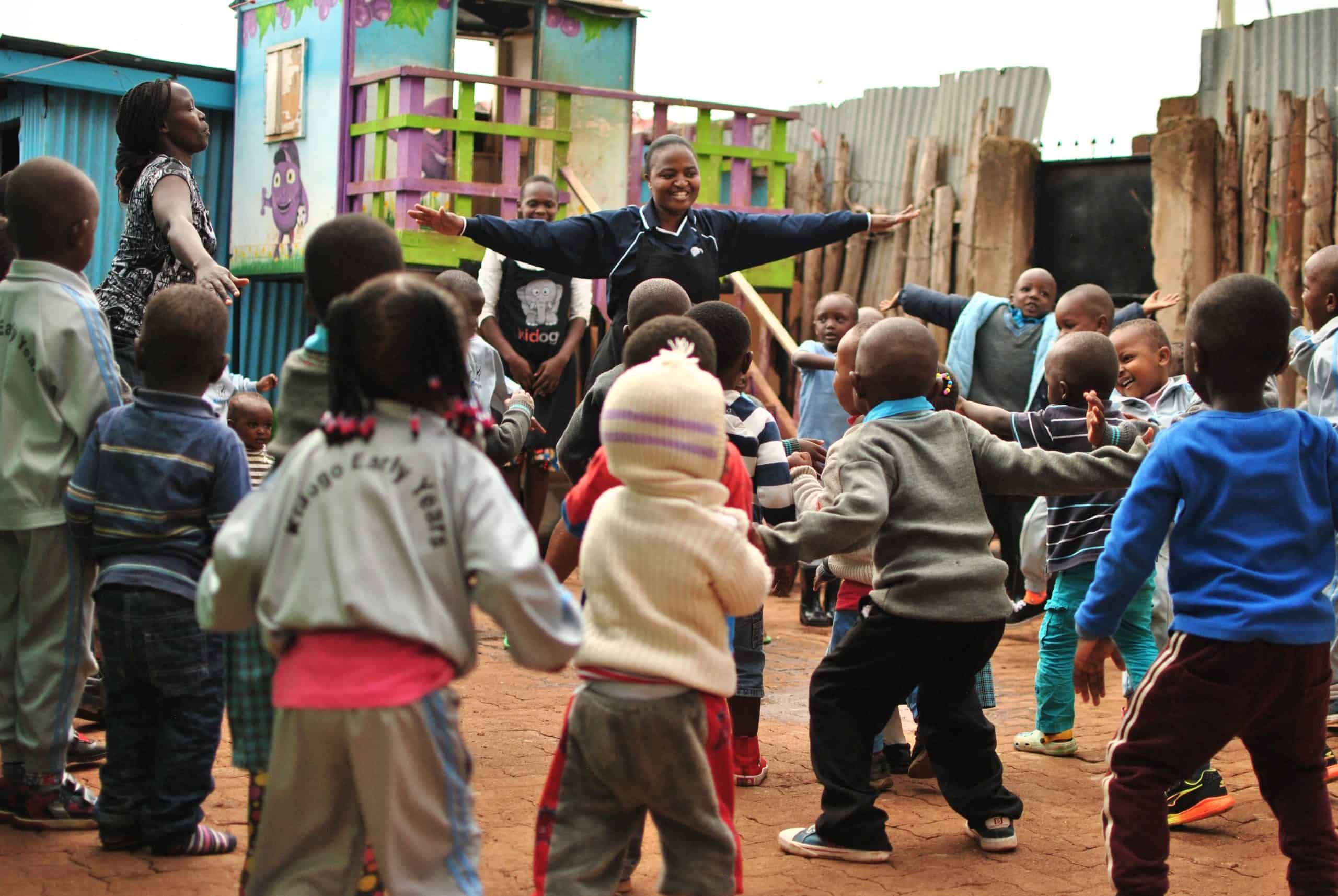
Kidogo Innovation uses a social franchising model to partner with entrepreneurial women entrepreneurs (Mamaprenuers) to help them start or improve their own early childhood education micro-businesses.
The company creates an avenue for; children to receive physical, social, and cognitive stimulation which enables them to enter primary schools with a strong foundation and adolescents who previously carried the brunt of child-rearing to return to school . Over the past 7 years, through a network of 500 Mamapreneurs, Kidogo has become the largest early childhood education provider in Kenya reaching over 11,000 low-income children and their families every day.
Kidogo’s expansion to Kakuma-Kalobeyei will allow them provide skills training to women to run their own childcare micro-business, provide safe and quality childcare which will improve children’s development during their most crucial 1,000 days of life where 75% of brain development takes place. The expansion will impact 100 Mamapreneurs, 70 Franchisees and 2500 Children in the Kakuma-Kalobeyei area.
Visit the kidogo website here: https://www.kidogo.co/
Gallery
K-De Igratium International Limited
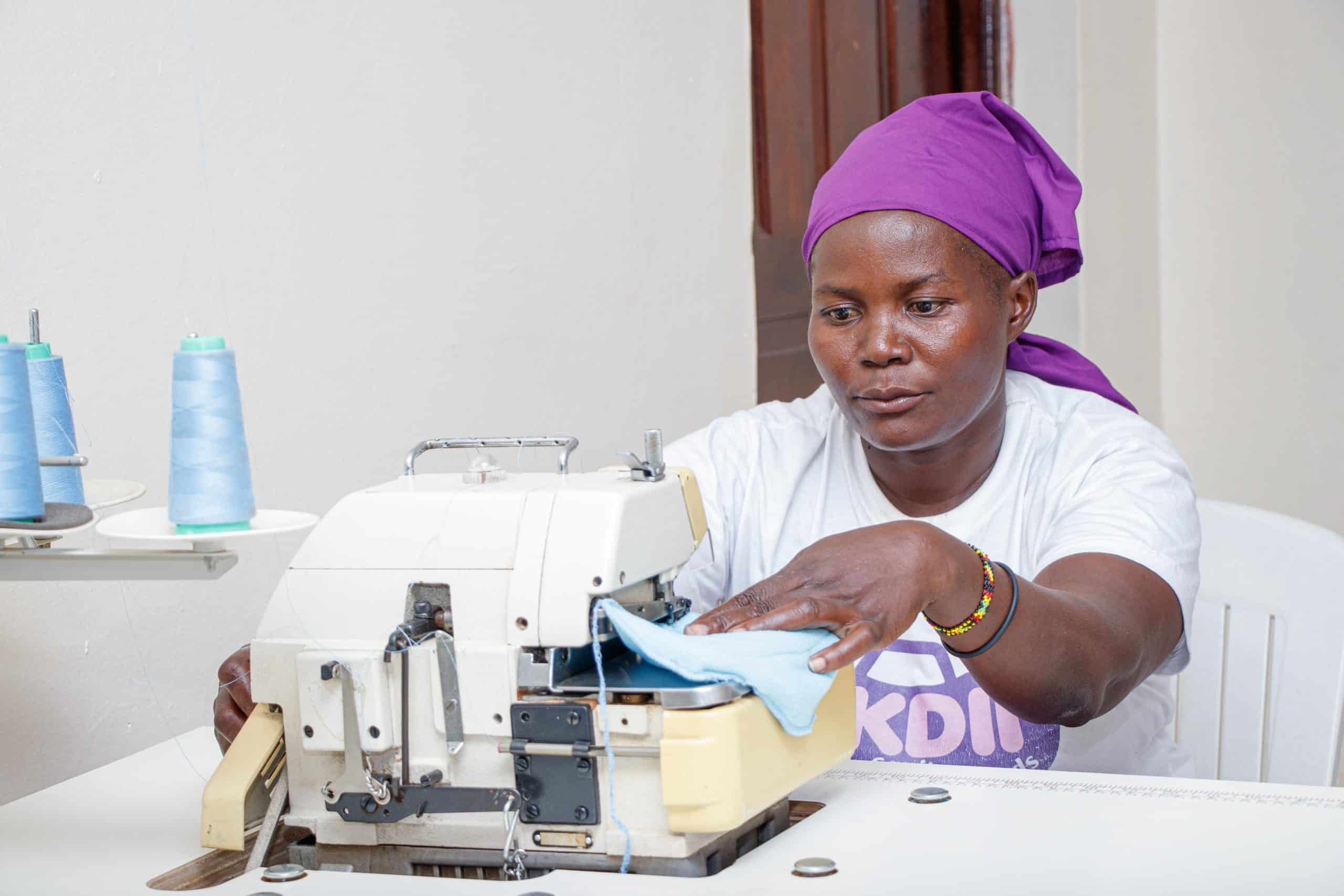
K De Igratium International Limited (KDII Ltd) addresses menstrual health challenges by supplying reusable sanitary towels that can be used for up to one year; this reduces the cost in low-income areas.
The company addresses waste management challenges caused by disposable pads with the core intent of ensuring that girls and women stay hygienic even during menstruation. These products improve the public health of girls and women since they are safe, easy to use and affordable.
Through the KKCF funding, the company is scaling up its operations into Kakuma-Kalobeyei with the establishment of a production and distribution centers in the area. This expansion will create direct employment for the host and refugee community at the production and distribution facilities. Additionally, the company will support at least 8000 households within the camp, town, and villages to access the re-usable pads with the ripple effect of helping them save their income noting that disposable pads are quite expensive.
Company FAQs
What attracted you to the Kakuma/Kalobeyei area? Why did you choose to apply for the KKCF funding?
I came to learn about the business environment as well as the unique community needs in Kakuma/Kalobeyei during a previous visit. Kakuma/Kalobeyei hosts a large refugee population as well as the local Turkana community, who are in dire need of sustainable menstrual health management (MHM) solutions for women and girls.
I applied for the KKCF funding to start a production facility for reusable menstrual pads and to create opportunities for economic empowerment through employment and business opportunities.
What do you look forward to doing in Kakuma/Kalobeyei? How do you see your business growing in the next 5 years? What challenges have you had to overcome?
We seek to provide sustainable solutions for menstrual hygiene with safe and comfortable reusable pads along with MHM education for women and girls in Kakuma/Kalobeyei. The KDII pads will be produced in Kakuma by women from both the refugee and host communities. In the next five years, we intend to reach 20,000 households and establish KDII as a positive contributor to the economic growth of Kakuma/Kalobeyei.
We must overcome the challenge of social stigma associated with menstrual health solutions. The high logistical costs and power unreliability are also some of the key challenges to be tackled.
What are the foreseeable impacts in the Kakuma and Kalobeyei area following your interventions?
Social Impact
Stigma around menstruation – Education and marketing awareness work together to eliminate stigma by enhancing women’s productivity and girl-child education.
Community inclusivity – KDII will be identified as a local economic empowerment project as a result of generating employment in both the refugee and host communities.
Economic impact
Accessibility to safe menstrual products will increase the economic productivity of women and girls by allowing women to work effectively even during their menstrual period, while girls will attend school without unnecessary interruptions. Employment opportunities for women at the production facility will facilitate economic empowerment. Due to the simplicity of the operation of the KRPP project, KDII will employ mostly women and youth (80%). Since the work does not require high skill, KDII will conduct training to empower youth to sell reusable pads, as well as encouraging them to work in the SMEs and local distribution networks.
Environmental impact
With the girls and women using KDII reusable pads, there will be a reduction in the excessive disposal of non-biodegradable single-use pads, either in toilets or in waste pits. In one menstrual cycle, a girl or woman can use up to 16 disposable pads. In one year, this translates into nearly 180 pads, yet the count can be sustained at just 5 reusable pads in an entire year.
What advice would you give other SMEs in fragile/difficult situations, with refugees and their host communities?
I would tell other SMEs that feasible business opportunities abound, even in the most difficult business environment, like Kakuma/Kalobeyei. One can still carry out profitable business while providing sustainable impact for the community.
Gallery
Hydroponics Africa Limited
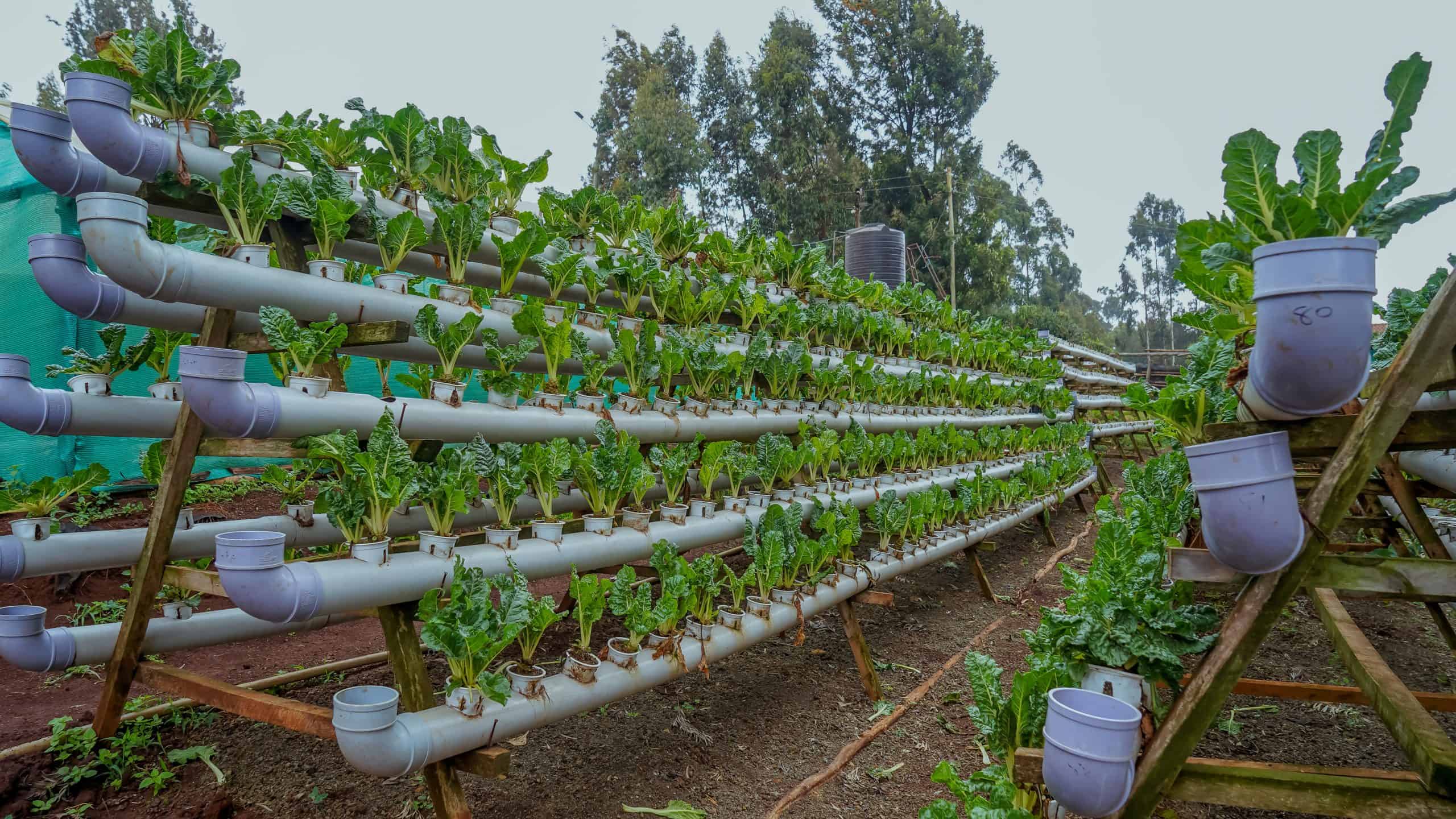
Hydroponics Africa installs simplified cost-effective hydroponic farming solutions that deliver value through less water usage, reduced labor and land requirements, and increase in crop yield.
The company focuses on production and selling of fresh farm produce, manufacture and Installation of hydroponic systems , distribution and Installation of plant responsive systems , manufacture, and distribution of hydroponic nutrients and biopesticides , provision of smart farming digital platform which offers agronomy crop support and management and certified training and consultancy of hydroponic and plant responsive technologies. For the last 5 years, the firm has created over 20,000 employment opportunities, trained 23,100 women and youths on hydroponics and entrepreneurship and enabled production of over 8,763 tons of fresh farm produce.
Through the KKCF Funding, Hydronics is establishing acres of centralized hydroponic farming with production, training, and value addition infrastructure. The project will enroll 1,000 beneficiaries into an apprenticeship program aimed at training and empowering them with work opportunities. Additionally, the impact will enhance food and livestock fodder at household level and provide direct market linkage that will reduce post- harvest losses.
Visit the Hydroponics Africa website here: https://www.hydroponicsafrica.org/
Company FAQs
What attracted you to the Kakuma/Kalobeyei area? Why did you choose to apply for the KKCF funding?
Our aim is to feed the whole world by utilising a minimum of resources and saving water, and we were attracted to the available opportunities in the area; with the main point of attraction being the fresh produce market in the Kakuma-Kalobeyei area. The other main attraction point is the adaptability of hydroponic farming, as a preferable farming method because it uses minimal amounts of water and requires less manpower.
What do you look forward to doing in Kakuma/Kalobeyei? How do you see your business growing in the next 5 years?
We see ourselves as the largest producer and market of fresh produce in the area. Kakuma will move from being an importer of fresh produce to become an exporter. With improved
infrastructure and the discovery of more fresh underground water in the area, farming will become more viable.
What are some of the foreseeable impacts in the Kakuma and Kalobeyei area following your interventions?
We expect that:
- Locals will be able to get more fresh produce at a lower cost.
- There will be more direct and indirect employment opportunities leading to the economic empowerment of the local people.
- There will be a transfer of modern farming knowledge to the locals.
- The creation of water points will minimise water scarcity.
What advice would you give other SMEs in fragile situations, with refugees and their host communities?
- Start with the County Government for easier access to the host and refugees, and to collect relevant business data
- Engage and employ locals so that they have ownership of the project
- Carry out due diligence of the politics of the area
- Collect as much data as possible and try to drop the donor tag to avoid being overcharged for services. Both locals and refugees expect a higher payment of services and products from companies with a donor tag
- Liaise with the Deputy County Officer and Liaison officers for a better understanding of the security issues
Gallery
AEC Kenya
AEC Kenya is a social enterprise that provides investment products and consulting/training services in underserved areas, including Kakuma/Kalobeyei and Dadaab.
AEC Kenya recognizes the potential of refugee communities, often overlooked by one-size-fits-all traditional aid model. The company positions refugees as clients which allows them choice and mutual accountability. To date, AEC Kenya has provided 1,800 refugee and host entrepreneurs in Kakuma-Kalobeyei with business advisory services, disbursed 354 low-cost investments, including more than 70 Sharia-compliant products for Muslim clients, and 1,040 one-time COVID-19 relief grants.
Through the KKCF funding, AEC Kenya will serve and impact 200 entrepreneurs in Kakuma-Kalobeyei. The company will also equip entrepreneurs with skills to become investment ready, financial resources and practical tools to create significant revenue and jobs.
Visit the AEC website here: https://www.aec-kenya.com/
Company FAQs
What attracted you to the Kakuma/Kalobeyei area? Why did you choose to apply for the KKCF funding?
AEC Kenya is a subsidiary of African Entrepreneur Collective (AEC), a US non-profit organisation, supporting micro and small businesses, including refugee-owned enterprises, with business development services, access to finance, market linkages and supply chain integration to thriving communities across East Africa.
Since launching in Rwanda in 2012, AEC has supported more than 29,000 refugee/host entrepreneurs across East Africa. Our success in Rwanda demonstrates that when refugee and host entrepreneurs have access to relevant business development services, tools and affordable finance, they will not only live more independently, but they will also contribute significantly to their refugee and host communities.
With over 200,000 refugees across Kakuma Refugee Camp and Kalobeyei Integrated Settlement, and having recognised Kakuma as a marketplace inspired and informed by research, including the 2018 IFC report and AEC scoping visits, we knew that Kakuma/Kalobeyei would be next on our expansion list after proving that our refugee entrepreneurship programme model works in Rwanda.
In 2019, AEC expanded the refugee entrepreneurship programme from Rwanda to Kakuma/Kalobeyei, and since then, we have worked with 3,382 entrepreneurs (58% women) in Kakuma/Kalobeyei; opening up more expansion opportunities to scale our impact across Kenya, including Dadaab Refugee Complex, Mombasa as well as in Ethiopia.
Finally, the KKCF funding opportunity aligns perfectly with our vision for impact and growth in refugee communities, specifically in Kakuma/Kalobeyei, as well as with our proven business model.
What do you look forward to doing in Kakuma/Kalobeyei? How do you see your business growing in the next 5 years? What challenges have you had to overcome?
With KKCF funding, AEC Kenya seeks to have additional market insights, a larger investment portfolio, and double-bottom-line impact to demonstrate to investors the commercial viability of lending to refugees.
Based on our projections, with KKCF funding, 25% of AEC Kenya’s operating costs will be fully sustained with earned revenue by 2024, reaching 60% earned revenue by 2026.
Here below are some challenges we have faced to date:
– In general, weathering the COVID-19 pandemic and the most recent camp closure announcements by Government of Kenya have been the biggest barriers to achieving our milestones as initially planned. However, we see continued recovery and a lessening of restrictions, hence better results compared to the past two years, which creates hope as we carefully watch the trends and pivot accordingly.
– Additionally, some participants who had taken part in other business development programmes with less stringent standards for participation and loan/investment repayments, dropped out of AEC’s cohorts when they learned there would be no immediate financial gain.
What are the expected impacts you foresee in the Kakuma and Kalobeyei areas following your interventions?
With support from KKCF, AEC Kenya foresees the following results:
#1: Skills Improvement – 75% of participants keep frequent records and demonstrate new skills.
#2: Revenue Growth – 75% of businesses increase revenues, minimum US$880K combined growth.
#3: Job Creation – 50% of participants will create jobs, totalling 540 new jobs created.
What advice would you give other SMEs that are working in fragile/difficult situations and with refugees and their host communities?
In light of AEC Kenya’s 4-year experience and learnings from supporting refugee and host community entrepreneurs in Kenya, and subsequent expansion to Ethiopia in 2021, our advice to other SMEs include:
- Having a clear understanding of the micro, small and medium enterprise dynamics of refugees and hosts before launching programmes, following key guiding questions such as: What type of market is this? For instance, Is it a consumer, producer, services or business to consumer or business to business market?
- Having a clear understanding of the value chain (i.e. what works and what doesn’t work?)
- Leveraging existing business networks, partnerships on the ground and following market trends to inform programming and operations decisions.
- Building trust and setting clear programming expectations.
- Ensuring accountability to deliver on promises.
Finally, we know that every market has its own dynamics and not every advice will be applicable for all contexts. Therefore, AEC Kenya is open to sharing our experiences for specific needs upon request, and we would also be interested to learn best practices from other like-minded SMEs.
Gallery
Wessex Social Ventures
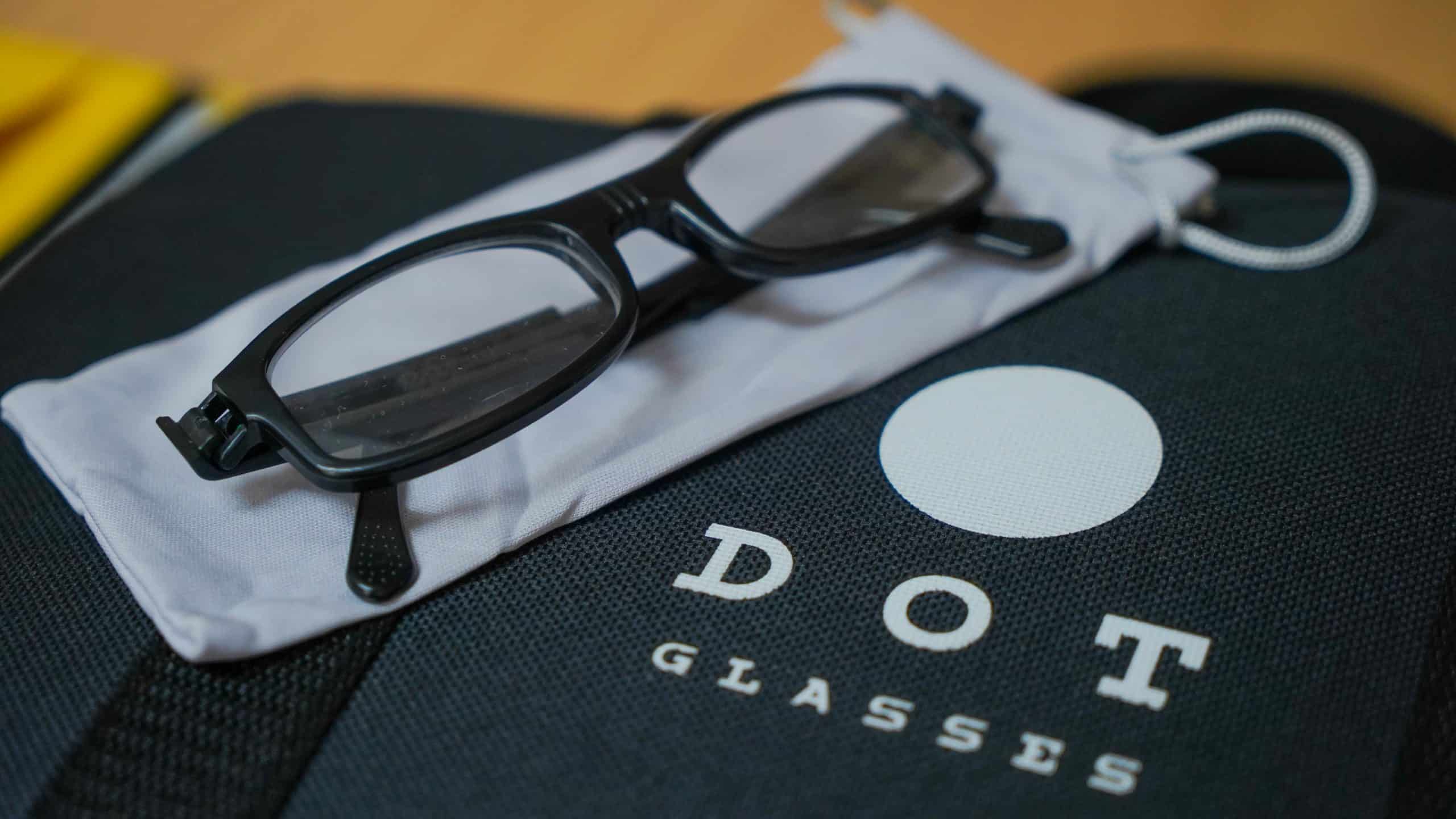
Wessex Social Ventures (WSV) is a social enterprise that avails DOT Glasses to communities in 14 countries in East Africa, West Africa, South Asia, and Central Asia. In Kenya, DOT Glasses focus on rural and peri-urban areas targeting the poorest and most underserved.
DOT Glasses provides low-cost adjustable eyeglasses to those who could not previously afford or access them. Through a network of local retailers, glasses can be dispensed in local communities while more serious cases are referred to the existing vision clinics.
Through KKCF funding, DOT Glasses are building a sustainable, self-financing network of micro-entrepreneurs to test vision and dispense glasses. This will create jobs in the Kakuma/Kalobeyei area while helping both the refugee and host communities to improve vision – which will have a positive effect on work productivity, school performance, safety, and general life satisfaction. Lessons learned from the Kakuma Kalobeyei area will see DOT Glasses scaling to other refugee camps.
Visit the DOT Glasses website here: https://www.dotglasses.org/
Company FAQs
What attracted you to the Kakuma/Kalobeyei area? Why did you choose to apply for the KKCF funding?
The core essence of WSV’s mission is to support communities to address fundamental development barriers. In DOT Glasses, we seek out underserved communities with no basic eyecare options or glasses distribution. The KKCF funding has enabled us to bring DOT Glasses to an isolated and high-risk location to establish sustainable foundations and scale within a significantly reduced timeframe and overall cost.
What do you look forward to doing in Kakuma/Kalobeyei? How do you see your business growing in the next 5 years? What challenges have you had to overcome?
We look forward to bringing the gift of good sight to the estimated 35,000 people who need eyeglasses; enabling them to learn, earn and live better, and prevent issues of low self-esteem and compromised
safety.
In the next 5 years, our work in the KK area will provide a springboard into northwest Kenya and neighbouring regions. We are expanding eyecare accessibility and the distribution of truly affordable eyeglasses. Ours is a sustainable model without any subsidy.
This is the first time we are operating in the KK area and the first time we are operating in a predominantly refugee context. Fortunately, we were able to hire from the host community, thus leveraging the experience of gained from working in the camp with networks of agents. UNHCR have also been immensely helpful in navigating the various health partners in the camp as well as engaging the local government.
What are some of the foreseeable impacts in the Kakuma and Kalobeyei area following your interventions?
- Directly creating 18 jobs
- Providing the gift of good sight to 35,000 people
- Increasing working people’s incomes by 18%
- Improved education performance among students who were previous three times more likely to fall behind their peers. Eye glasses have three to 10 times greater impact on education performance than de-worming or nutrition support (Seeing is Learning, 2017)
What advice would you give other SMEs that are working in fragile/difficult situations, with refugees and their host communities?
We have only just started working in the KK area. However, we have two key pieces of advice:
- Find a strong supporter at UNHCR who likes what you are doing, this has made accessing potential partners and government officials much easier.
- Recruit local staff. They understand the culture and systems.
